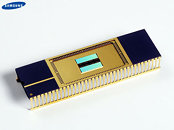Wednesday, May 6th 2009

Samsung PRAM Reaches Production in June
Silicon giant Samsung is making PRAM a reality next month, after its announcement back in 2006. PRAM, or phase-change random-access memory, uses a technique of phase-transition of chalcogenide glass to store data. The active component can quickly change its form from crystalline, to micro-crystalline (amorphous), when subjected to charge. The cycle takes place so quickly, that it can be used to store and deliver data at speeds up to 30 times higher that NAND or NOR flash memory, and support write-cycles at least 10-times higher than the two.
The best of both NOR and NAND are on offer: the random-access speeds of NOR, and the permanent-storage of NAND. The first line of PRAM chips from Samsung are set for mass-production in June. It will arrive in capacities of 512 MB. On its application front, so far no other companies have announced products that can utilize the new technology, nor has such an announcement come from Samsung, but the company will definitely need a few "launch-vehicles" for PRAM in the very near future.
Source:
Electronista
The best of both NOR and NAND are on offer: the random-access speeds of NOR, and the permanent-storage of NAND. The first line of PRAM chips from Samsung are set for mass-production in June. It will arrive in capacities of 512 MB. On its application front, so far no other companies have announced products that can utilize the new technology, nor has such an announcement come from Samsung, but the company will definitely need a few "launch-vehicles" for PRAM in the very near future.

21 Comments on Samsung PRAM Reaches Production in June
Samsung just makes a cool video, like their sheep led videos or ssd awesomeness video and convince me with abit of laugh and wowness.
For those who havnt seen those:
SSD awesomeness-Samsung
Extreme Sheep LED Art-Samsung
They compare the speed to existing non volitile ram - how does it compare to todays DDR speeds?
Sorry, maybe I'm just too ignorant as to how fast permanent storage can get, but if the technology gets there, am I wrong to assume that's how it will work?
Edit : Yeah .. imagine that too... finally merging ram and permanent storage - no need for ram anymore - just use a swap file... yer HDD IS ram.
I still think a small amount of dedicated ram is still a good idea, a couple of gigs or so, just like how video cards are far better off with dedicated ram... but once yer swap file works at ram speeds, would you ever truly need to buy more?
Even if they used the same technology, one will be optimised for speed, one for reliability - so theres a potential for ram and HDD's to be the same technology, but implemented differently.
Also, you need ram when you power on modern PC's... if its on the HDD, they'd need to redesign the entire thing (how do you 'format' the HDD and assign ram vs storage?)
And system RAM can always be build to be a technological "combination" of the best of storage technology and cache technology. Therefore system RAM will always be faster than storage technology in the optimal "workstation". Price will also be somewhere inbetween the $ cost of cache and $ cost of storage.
However, your argument is valid for the "discount" or "microsize" segments.
That, and that alone will allow me to further consider the next generation use for this technology.
So far, it sounds promising, and Samsung always have my attention. It almost reminds me of something HP developed this time last year.